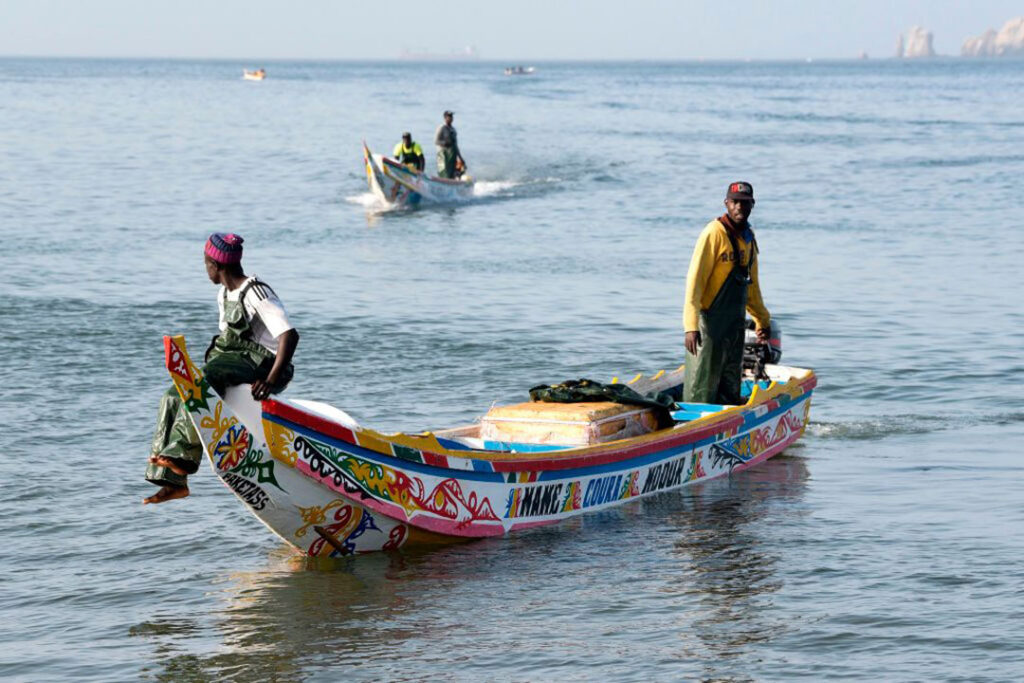ADF STAFF
Mamadou Dien huffed as he dragged his brightly painted fishing canoe onto the beach of a tiny village in Senegal. After four fruitless hours at sea, he held up his meager catch using only his thumbs and index fingers.
“Today, the catch was not good,” he told Voice of America (VOA). “When it’s a good catch, you can make up to 70,000 francs (about $130) per day.”
Nearby, a dejected Abdullah Dieta said he caught four grouper in three hours.
“Our grandfathers tell us they could see the fish in abundance from here, from the beach,” Dieta told VOA. “Today, when you tell them we have to sail for miles to find fish, they don’t believe it.”
The sardinella and other small pelagic fish caught in Senegal have provided up to 75% of the protein consumed domestically and in interior countries such as Burkina Faso and Mali, the BBC reported.
But 90% of Senegal’s fisheries now are fully fished or facing collapse, according to the United Nations. Senegal’s fish are mostly caught by large Chinese trawlers and exported to Asia and Europe, often as fishmeal or fish oil produced at Chinese-owned factories.
China commands the world’s largest distant-water fishing fleet, with up to 17,000 vessels, according to a study by the Overseas Development Institute. Its trawlers are infamous for illegally fishing in protected waters and using a range of illicit tactics to catch far more fish than allowed.
The Global Initiative Against Transnational Crime ranks the nation as the world’s worst illegal, unreported and unregulated (IUU) fishing offender.
China’s distant-water fishing fleet began casting nets around the globe after the country overfished its own waters, a predicament that didn’t quell its hunger for seafood. The nation of 1.4 billion people consumes 38% of global fish production and has one of the world’s highest consumption rates of fish and seafood at 37.8 kilograms per person annually, according to a Foreign Policy report.
The situation in Senegal is familiar to local anglers around West Africa, where roughly 7 million people depend on fishing for income, and up to 50 million are at risk of food insecurity and malnutrition.
For years, artisanal fishermen in Mauritania have complained that foreign trawlers are seriously depleting the area’s fish populations. In 2017, a Chinese conservationist interviewed the captain of a Chinese trawler off Nouadhibou and later wrote about the experience for Greenpeace.
“Sometimes we catch too much,” said the captain, who gave his name as Zheng. “The freezer[s] are full of fish, and there is no space left for more, so we have to throw away tons of caught fish.”
Much of the discarded catch was dead.
“Wherever we sail, there will be no fish left in the ocean,” Zheng said.
In 2020, China guaranteed it will continue fishing in Mauritania when it loaned the country $87 million to build a new fishing port just north of Nouadhibou.
Along the coast of Sierra Leone, entire communities depend on the sea but are facing depleted fish stocks. Local artisanal fishermen like Abu Bakr Aconteh blame foreign trawlers, three-quarters of which are Chinese, the BBC reported.
“We would like the government to take these people away, to stop fishing in this country,” Aconteh said.
In Ghana, illicit fishing threatens to destroy small pelagic fish populations, such as sardinella, which has dropped 80% in the past two decades, the Environmental Justice Foundation reported.
China’s rampant overfishing in West Africa can’t continue without devastating consequences,
Percy Showers, a marine biologist at Freetown University in Sierra Leone, told the BBC.
“Once [an] ecosystem is destroyed, it’s almost impossible to restore it again,” Showers said.

